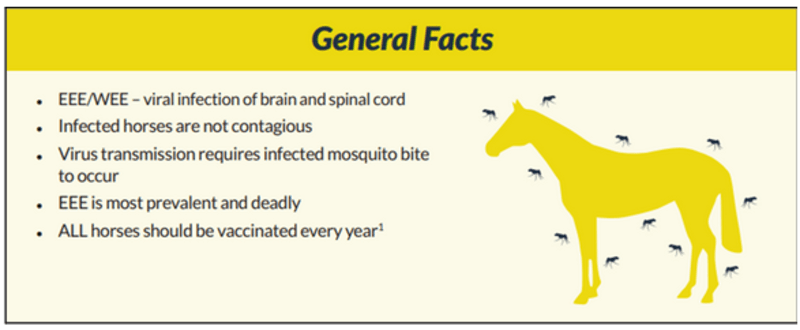News Excerpt:
Recently, On December 20, 2023, the International Health Regulations National Focal Point (IHR NFP) in Argentina alerted the Pan American Health Organization/World Health Organization (PAHO/WHO) of a human case of Western Equine Encephalitis Virus (WEEV) infection.
Key Points:
- The outbreak has since grown to 21 confirmed new cases of the infection in Argentina and comes after more than two decades since the last case was reported in the country.
- The last cases of human infections in Argentina were reported in 1982, 1983, and an isolated event in 1996.
- The present outbreak also comes in the context of an ongoing outbreak in horses in Argentina and Uruguay.
- Multiple outbreaks and human cases of Western Equine Encephalitis have been reported in the past from the U.S. and Canada and over 3,000 cases of infection have been reported over these years.
Mosquito-borne infection
- Western Equine Encephalitis is a mosquito-borne infection caused by the WEEV, which belongs to the genus Alphavirus of the Togaviridae family of viruses.
- The virus has an approximately 11.5 kilobases long single-stranded RNA genome and is a recombinant of the eastern equine encephalitis virus and a Sindbis-like virus.
- Passerine birds are thought to be the reservoir and equine species as intermediate hosts.
- In humans, the WEE virus can cause disease ranging from subclinical or moderate symptoms to severe forms of aseptic meningitis and encephalitis.
- Mode of Transmission: The primary mode of transmission of the infection to humans is through mosquitoes which act as vectors for the virus.
- While most of the infections are asymptomatic, the infection may lead to severe consequences in rare cases.
- An estimated 4-5% of cases may manifest as infection/inflammation of the brain, resulting in neurological symptoms and sequelae of disease.
- With no specific antiviral treatment, symptomatic care is crucial, especially for neurologic symptoms.
Western Equine Encephalitis Symptoms
- Symptoms of western equine encephalitis in humans usually manifest 5 to 15 days after infection from a mosquito bite.
- The usual symptoms include:
- Fever
- Headache
- Nausea
- Vomiting
- Poor appetite
- Tiredness
- Weakness

Way forward:
- While PAHO/WHO has issued an alert on the risk of the spread of WEEV in the Americas, enhanced surveillance and detection of infections will be crucial for preventing the spread of the virus.
- Following a One Health approach is essential for the control of the virus.
- Environmental modifications, vector control, and vaccination for equines in affected and high-risk regions to curb the potential spread of the virus.
- Surveillance: In at-risk areas with reported active outbreaks in animals, strengthening surveillance is recommended with active human case finding for compatible neurological syndromes without any other defined diagnosis, taking into account the incubation period, geographic area, and environmental conditions.
- Prevention Measures: Preventive actions, listed below, must be organized within the framework of One Health, considering the inter-institutional and comprehensive action between animal health, human health, and the environment.
- Vector Control: Vector control measures for the WEE virus should be considered within the Integrated Vector Management (IVM) framework.
- Vaccination in equines: Vaccines are available for equines. It is advisable to seek high vaccination coverage among susceptible equines in areas considered at risk and to carry out annual vaccination boosters.


